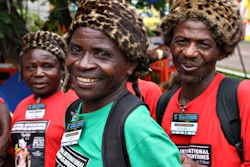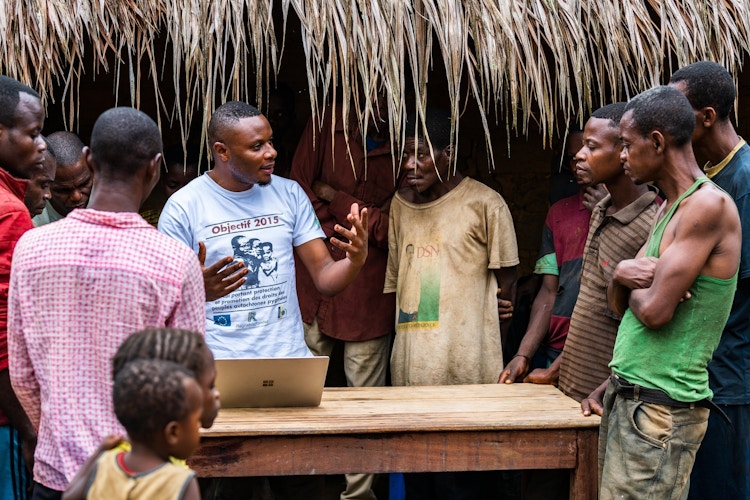
New law adopted in DR. Congo to promote and protect Indigenous peoples’ rights
Years of Indigenous-led activism has paid off as president Félix Tshisekedi signs a ground-breaking national law with far-reaching implications for Indigenous peoples and forests in the Democratic Republic of the Congo.
The Indigenous peoples of the Democratic Republic of the Congo have suffered extreme political, economic and social marginalization. They have been thrown out of their traditional territories, and they face major economic and social challenges. The new law on the Promotion and Protection of the Rights of the Indigenous Pygmy Peoples, the first of its kind, was signed into law by the president on the 15th of November 2022 and is a major legal breakthrough for Indigenous people in DRC.
The law will, among other things, strengthen the rights of Indigenous peoples and give them access to essential social services. The law recognizes Indigenous peoples' right to the lands and natural resources they own or use.
The law also supports Indigenous peoples' right to free, prior and informed consent in matters concerning development on their territories. This law is essential in a country where the pressure on the rainforest from oil and gas extraction, mining, timber companies, and industrial agriculture is increasing. Congo needs development, and there is tension between the desire for forest protection and the desire for economic progress. Congolese authorities announced plans to auction off oil and gas blocks in July 2022. Parts of these exploration blocks are located in rainforest territories.

The Indigenous peoples of the Congo
- The indigenous groups in the Congo include the Mbuti, Baka and Batwa. They are better known in the West under the collective term pygmies.
- The number of Indigenous peoples is very uncertain and estimated to be around 6-700,000.
- They traditionally live as nomads or semi-nomads in the rainforest.
- In many cases, they have been forced out of their rainforest areas, and their traditions and way of living are threatened.
- The indigenous population has a lower standard of living than the rest of the population, and they face massive discrimination.
Years of hard work
The government in DR: Congo has previously committed to "legally secure Indigenous peoples' traditional lands and territories as large natural, ecological and collective reserves, according to their wishes and under their control." This commitment has now become a legal reality.
" This is a tremendous victory that first and foremost belongs to Indigenous peoples and their organizations", said Toerris Jaeger, Executive Director of Rainforest Foundation Norway.
The work behind this law has been led by partners of Rainforest Foundation Norway in DR. Congo, DGPA (Dynamique des Groupes des Peuples Autochtones) and REPALEF (Réseau des Populations Autochtones et Locales pour la Gestion Durable des Ecosystèmes Forestiers).

COORDINATOR: Patrick Saidi, National Coordinator for DGPA, contributed to the extensive work that went into passing the new law on the Promotion and Protection of the Rights of the Indigenous Pygmy Peoples. Photo: DPGA
Dynamique des Groupes des Peuples Autochtones is difficult to translate from French, but directly translated means "Dynamics of Indigenous Groups". Réseau des Populations Autochtones et Locales pour la Gestion Durable des Ecosystèmes Forestiers means "The Network of Indigenous Peoples and Local Peoples for the Sustainable Management of Forest Ecosystems".
DGPA was established in 2009 as an umbrella organization of several organizations that defend the rights of Indigenous peoples. The indigenous leaders behind the DGPA shared one common vision – a national law that would recognize and safeguard Indigenous people's identity, way of living and basic human rights.
"At first, nobody believed it was possible. We had to work hard to convince decision-makers of the absolute necessity of such a law. Thankfully, we assembled a small group of parliamentarians who were sympathetic to our cause soon enough; and they have supported us and shared our message to their peers throughout this process", recalls Patrick Saidi, National Coordinator for DGPA.

INDIGENOUS VILLAGE: A Mbuti village in the rainforest in DRC. The Mbuti are an Indigenous people closely linked to the rainforest. Photo: Johan Wildhagen
Collective effort
Indigenous peoples from many different areas in DRC have contributed to the drafting of the law:
"It was vital for Indigenous peoples to be at the forefront of this process if the law was to be grounded in the manifold aspirations and living conditions of these communities", says Felana Rakotovao, head of the Rainforest Foundation Norway's country office in DRC.
Felana is happy and grateful for the new law and the work behind it, and at the same time she makes an appeal:
"Congratulations to the DRC for this historic commitment, the Indigenous Pygmy peoples for their determination and all their organization representatives for the long advocacy works that they achieved. We call on all actors in DRC to involve themselves in the implementation of the law to make it a reality for the Indigenous Pygmy peoples."

MAIN DRIVER: The main driver behind the destruction of the rainforest in DRC is small-scale farming, but the threat from industrial agriculture, mining and oil extraction is increasing. Photo: Chris Scarffe/Syncronicity Earth
Important signal
By passing this law, the DRC signals its willingness to rely upon Indigenous knowledge and practices in the management of forests and biodiversity. At the same time, the authorities give the Indigenous peoples an important role in fulfilling DRC’s international obligations. The law is likely to become a model for Indigenous peoples working with national legal protection in other African countries.